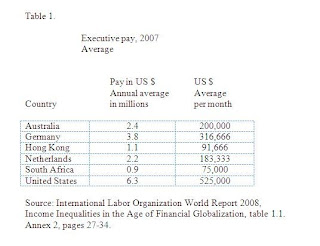But, what is a just wage?
It is the amount of money for acquiring the goods that a person or a family need for getting welfare.
And what is the welfare?
It is health, food, dress, house, education, recreation, security and stable job; this mean quality of live. The problem is that the most part of the world population do not enjoy of those benefits; the great challenge is changing that situation.
Restrictions of natural resources, especially of water and energy, the scarcity of capital ---know how, technology, goods of capital, infrastructure and money--- do not help to carry out a global and effective program of employments and just wages.
A cause of the poverty
The other great problem is the inequality in the income distribution. The salaries are the basic indicator of the poverty or the well-being of a society.
There is a huge gap between the bosses and executives earnings and the workers salaries.
Only in the developed industrialized nations the workers receive an income for satisfying part of its necessities. In the rest of the world the wages are not enough neither to eat, as it is demonstrated in the following tables.

In Australia an executive receive an average of 200,000 US $ of salary per month, but a worker obtain (minimum wage) 1,908 US $ per month; something similar happen in Germany where the average salary of an executive is of 316,666 US $ per month while a worker obtain (minimum wage) 1,701.26 US $.
But the most difference is in the United States, where the monthly of a worker is of 1,209.60 while the executive earning (average) is of 525,000 US $; this mean 434 times more than the former.

Australia pays the higher wages to their workers, followed by France, Germany, the United Kingdom and Italy in the first five places. In this table the United States is in the sixth position regarding the workers earnings, but the United States is in the first place regarding the remuneration of their executives.
Of the selected countries of Asia, Bangladesh has the lesser income followed by Vietnam and China. A person that visited the industrial city of Guangzhou said to me that the workers in that city are practically slaves; they receive a salary of approximately 120 US $ per month and work the thirty (30) days of the month.
Of the selected countries, the communist nations of the past (Russia) and of the present (China and Vietnam) are the societies where the workers receive the lesser wages; in change, in the developed capitalists nations the workers obtain the higher salaries. This reveal the failure of the communism system and it explain why the communism disappeared in the former Soviet Union and in the Eastern Europe.

The situation in Africa is worse than the situation in the poorest nations of Asia.
In Latin America the Dominican Republic has the major wage but that is an exception in the region and in the rest of the underdeveloped nations.
The extreme poverty in Latin America is a sad reality. The case of Brazil and Mexico, which economies are situated between the first ten economies of the world is something that deserves to be considered with special attention: in both countries the minimum wage was less of 100 US $.
Brazil and Mexico have an important industrial development but is evident that their governments have been not able of establishing a fair wage for the workers.
In the most countries of Latin America still exists concentration of the property of the land and a good part of the peasants live in precarious conditions.

Key of the economic expansion
The economic expansion is not possible without just salaries; the politicians and the private entrepreneurs should be aware of this true.
The wages are the force that impulse the market; they are the key factor that determines the effective demand behavior.
A first step for combating the poverty is to increase the wages to a level that let to the workers satisfying its basic necessities.
If the underdeveloped nations do not make an effective effort for improving the wages the poverty will remain and vice verse.
Conclusion
The analysis of the economic reality lead to a conclusion: the most workers in the world are practically slaves because its salaries hardly let them to eat. Only in the developed industrialized nations this does not happen. Nevertheless, the difference between the wages of the executives and the workers earnings in the industrialized countries is something unbelievable: is hundreds of times superior.
It is necessary to carry out a global program for combating the poverty, preserving the natural resources and the environment.
One way are the ecological employments, through a global program of reforestation and conservation of the forests that still survive, as the Amazonia Region. The base of that program should be fair wages for the workers.
This program does not require a great amount of energy for to be developed; in change, other economic activities in the agriculture and the manufacture need a very important amount of energy, oil and coal especially. The world is running out of basic natural resources as water and petroleum. It is a global shortage of resources that change the economic paradigm.
The great problem of the humankind is that the worlds need more food and more manufactured goods, but there is not enough water nor petroleum for sustaining those requirements. In some regions, like China, there is abundance of coal but this is most contaminant source of energy. The other sources as the nuclear energy are too very dangerous, while the industrial eolic and solar energy are not enough developed. So far, the research with hydrogen has been a success, especially in the transport sector, but still it is in the beginning.
The other great problem is that for developing the agriculture the forests are razed and without the forests the live is not possible.
It is necessary a balance between the necessity of producing the essential goods, the use of the natural resources, the creation of jobs and fair wages. Those are great challenges for the creative capacity, especially for the thinkers, scientists, politicians, economists, entrepreneurs and the mass media.





No hay comentarios:
Publicar un comentario